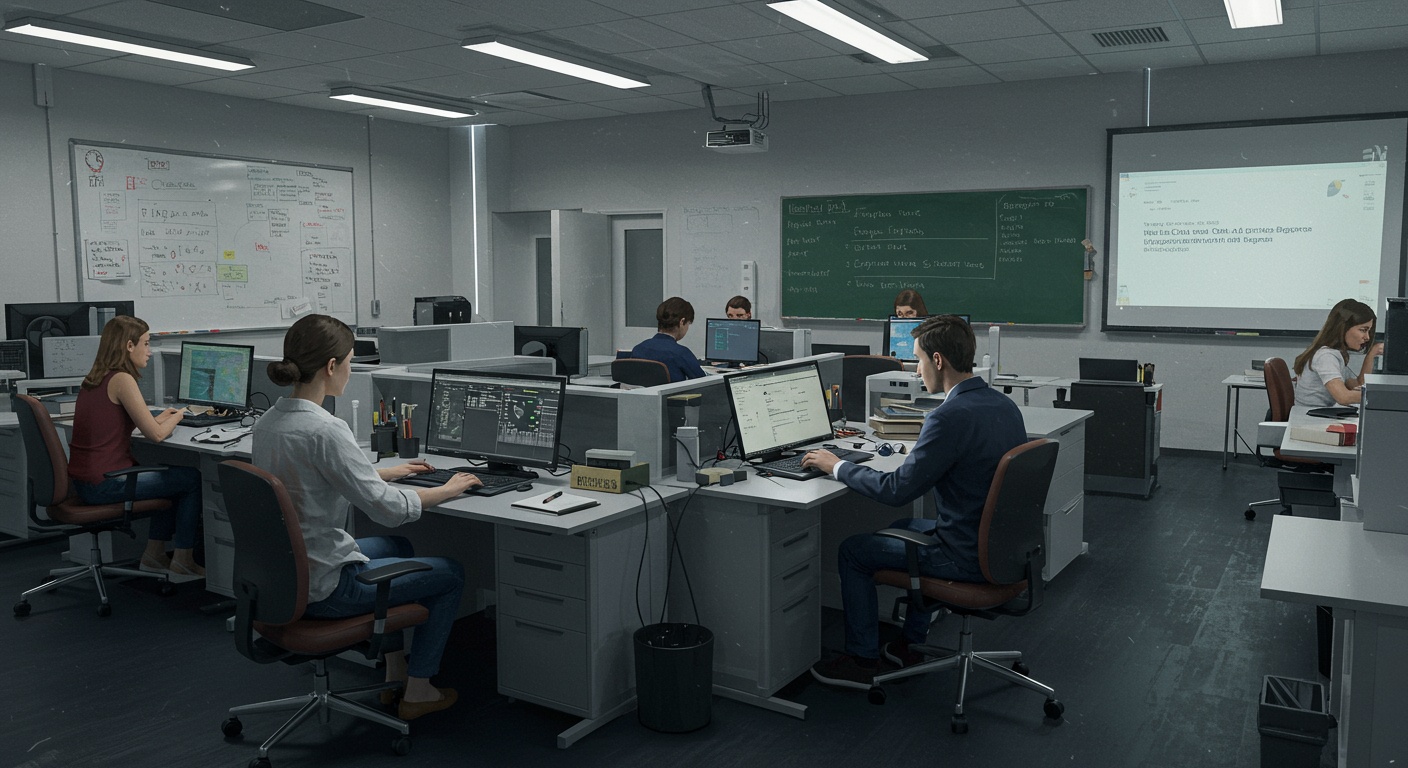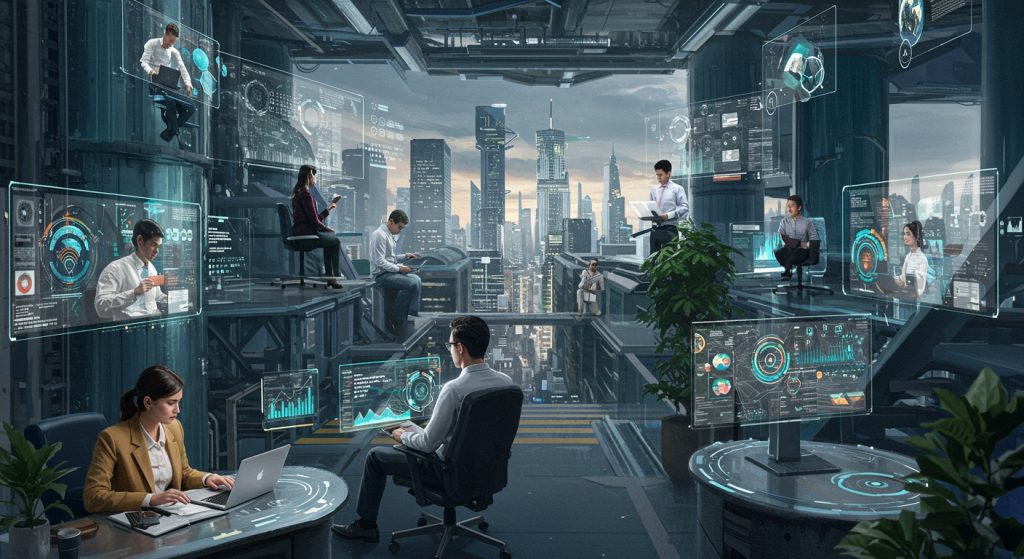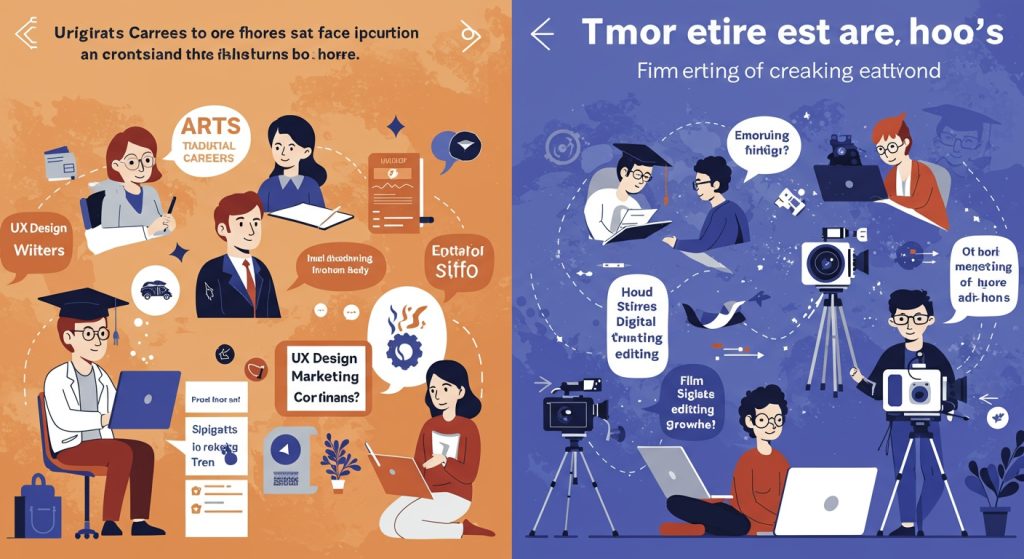A BSc in Computer Science opens doors. Which ones? Beyond the algorithms and data structures, consider the evolving landscape. The demand for AI specialists is skyrocketing, fueled by advancements in generative models like GPT-4. But it’s not just AI. Cybersecurity threats are increasing, creating a need for skilled ethical hackers and security analysts. This degree equips you to tackle these challenges head-on. We’ll explore career paths, from software engineering and data science to game development and network administration, revealing how core coursework translates into real-world impact. Prepare to navigate the diverse opportunities a Computer Science degree unlocks.

Decoding the BSc Computer Science Degree: A Foundation for Innovation
A BSc in Computer Science isn’t just a piece of paper; it’s a passport to a world brimming with opportunities. It’s a comprehensive education that equips you with the theoretical and practical knowledge needed to tackle complex problems using computational thinking. Let’s break down what this degree actually entails. Computer Science, at its core, is the study of computation and data. It’s about designing, developing. Analyzing algorithms and data structures to solve real-world problems. The BSc program typically covers a wide range of topics, including:
- Programming Fundamentals: Learning the basics of programming languages like Python, Java, or C++.
- Data Structures and Algorithms: Understanding how to organize and manipulate data efficiently.
- Database Management Systems: Learning how to design and manage databases for storing and retrieving details.
- Operating Systems: Understanding the inner workings of operating systems like Windows, macOS. Linux.
- Computer Architecture: Learning about the hardware components of a computer and how they interact.
- Software Engineering: Applying engineering principles to the development of large-scale software systems.
- Networking: Understanding how computers communicate with each other over networks.
- Artificial Intelligence (AI) and Machine Learning (ML): Exploring the concepts and techniques behind intelligent systems.
- Cybersecurity: Learning how to protect computer systems and networks from cyber threats.
- Web Development: Building dynamic and interactive websites and web applications.
These core concepts form the foundation for a wide range of specializations and career paths.
Software Development: Building the Digital World
One of the most common career paths for Computer Science graduates is software development. Software developers are responsible for designing, coding, testing. Deploying software applications. This can encompass a vast array of areas, from creating mobile apps to developing enterprise-level software systems. There are many different types of software developers, each with their own specific skills and responsibilities:
- Front-End Developers: Focus on the user interface (UI) and user experience (UX) of websites and applications. They use technologies like HTML, CSS. JavaScript to create visually appealing and interactive interfaces.
- Back-End Developers: Focus on the server-side logic and database management of websites and applications. They use languages like Python, Java. Node. Js to build the infrastructure that supports the front-end.
- Full-Stack Developers: Possess skills in both front-end and back-end development, allowing them to work on all aspects of a software project.
- Mobile App Developers: Specialize in developing applications for mobile devices, using platforms like Android and iOS.
- Game Developers: Create video games for various platforms, using game engines like Unity and Unreal Engine.
Software development is a constantly evolving field, requiring developers to stay up-to-date with the latest technologies and trends. Real-world Example: Consider a company developing a new e-commerce platform. Front-end developers would design the website’s layout and user interface, ensuring it’s easy to navigate and visually appealing. Back-end developers would build the server-side logic to handle user accounts, product catalogs. Payment processing. Full-stack developers might contribute to both the front-end and back-end, ensuring seamless integration.
Data Science and Analytics: Uncovering Insights from details
Data science is another rapidly growing field that heavily relies on Computer Science principles. Data scientists use statistical methods, machine learning algorithms. Data visualization techniques to extract insights from large datasets. Here’s a breakdown of key concepts:
- Data Mining: Discovering patterns and anomalies in large datasets.
- Machine Learning: Developing algorithms that allow computers to learn from data without explicit programming.
- Statistical Modeling: Using statistical methods to build models that describe and predict data.
- Data Visualization: Creating charts, graphs. Other visual representations of data to communicate insights effectively.
Data scientists work in a variety of industries, including finance, healthcare, marketing. Retail. They help organizations make data-driven decisions by identifying trends, predicting outcomes. Optimizing processes. Real-world Example: A marketing company might use data science to review customer data and identify target segments for specific advertising campaigns. A healthcare provider might use machine learning to predict which patients are at risk for developing certain diseases.
Cybersecurity: Protecting the Digital Realm
With the increasing reliance on technology, cybersecurity has become a critical concern for organizations of all sizes. Cybersecurity professionals are responsible for protecting computer systems and networks from cyber threats. Key areas within cybersecurity include:
- Network Security: Protecting computer networks from unauthorized access and attacks.
- Application Security: Ensuring the security of software applications.
- Data Security: Protecting sensitive data from unauthorized access and disclosure.
- Incident Response: Responding to and mitigating the impact of security incidents.
- Penetration Testing: Simulating cyber attacks to identify vulnerabilities in systems and networks.
Cybersecurity professionals need a strong understanding of computer science principles, as well as knowledge of security technologies and best practices. Real-world Example: A cybersecurity analyst might monitor network traffic for suspicious activity, investigate security incidents. Implement security controls to prevent future attacks. A penetration tester might simulate a cyber attack to identify vulnerabilities in a company’s systems and networks.
Artificial Intelligence and Machine Learning: Building Intelligent Systems
Artificial Intelligence (AI) and Machine Learning (ML) are transforming industries across the board. AI involves creating intelligent systems that can perform tasks that typically require human intelligence, such as learning, problem-solving. Decision-making. Machine Learning is a subset of AI that focuses on developing algorithms that allow computers to learn from data. Key concepts include:
- Deep Learning: A type of machine learning that uses artificial neural networks with multiple layers to learn complex patterns from data.
- Natural Language Processing (NLP): Enabling computers to interpret and process human language.
- Computer Vision: Enabling computers to “see” and interpret images and videos.
- Robotics: Designing and building robots that can perform tasks autonomously.
AI and ML are used in a wide range of applications, including:
- Self-driving cars
- Virtual assistants
- Fraud detection
- Medical diagnosis
- Personalized recommendations
Real-world Example: A company might use machine learning to develop a fraud detection system that can identify fraudulent transactions in real-time. A hospital might use computer vision to review medical images and assist doctors in making diagnoses.
Web Development: Crafting the Online Experience
Web development remains a vital and dynamic field, with a constant demand for skilled professionals. It involves creating and maintaining websites and web applications. Web developers need to be proficient in a variety of technologies, including HTML, CSS, JavaScript. Various web frameworks. Let’s compare different types of web developers:
| Type of Developer | Focus | Key Technologies |
|---|---|---|
| Front-End Developer | User interface and user experience | HTML, CSS, JavaScript, React, Angular, Vue. Js |
| Back-End Developer | Server-side logic and database management | Python, Java, Node. Js, PHP, Ruby on Rails, SQL, NoSQL |
| Full-Stack Developer | Both front-end and back-end development | Proficiency in a wide range of front-end and back-end technologies |
Web development is a constantly evolving field, with new technologies and frameworks emerging regularly. Web developers need to be lifelong learners to stay up-to-date with the latest trends. Real-world Example: A web developer might work on building a responsive website for a small business, creating an interactive web application for a large corporation, or developing an e-commerce platform for an online retailer.
Database Administration: Managing the Data Backbone
Database administrators (DBAs) are responsible for managing and maintaining databases, which are essential for storing and retrieving details in most organizations. DBAs ensure that databases are secure, reliable. Perform efficiently. Key responsibilities of a DBA include:
- Database Design: Designing and implementing database schemas.
- Database Security: Implementing security measures to protect data from unauthorized access.
- Database Performance Tuning: Optimizing database performance to ensure fast and efficient data access.
- Database Backup and Recovery: Implementing backup and recovery procedures to protect data from loss.
- Database Monitoring: Monitoring database performance and identifying potential problems.
DBAs need to have a strong understanding of database management systems (DBMS) such as MySQL, PostgreSQL, Oracle. Microsoft SQL Server. Real-world Example: A DBA might be responsible for managing a database that stores customer insights for a large e-commerce company. They would need to ensure that the database is secure, reliable. Performs efficiently to handle a high volume of transactions.
Game Development: Crafting Interactive Entertainment
Game development is a challenging but rewarding field that combines computer science principles with creativity and artistic skills. Game developers are responsible for creating video games for various platforms, including consoles, PCs. Mobile devices. Key roles in game development include:
- Game Programmers: Write the code that brings the game to life, implementing game mechanics, AI. Other features.
- Game Designers: Design the gameplay, levels. Overall experience of the game.
- Game Artists: Create the visual assets for the game, including characters, environments. User interfaces.
- Game Testers: Test the game to identify bugs and ensure that it is fun and engaging.
Game developers use game engines like Unity and Unreal Engine to create games. They also need to be proficient in programming languages like C++ and C#. Real-world Example: A game programmer might work on implementing the AI for enemy characters in a first-person shooter game. A game designer might design the levels for a platformer game. A game artist might create the 3D models for the characters in a role-playing game.
The Importance of Continuous Learning and Career Guidance
The field of computer science is constantly evolving, so it’s crucial to embrace continuous learning. New technologies, programming languages. Frameworks emerge regularly, making it essential to stay updated. Online courses, workshops. Conferences are excellent resources for expanding your knowledge and skills. Moreover, seeking out Career Guidance can provide invaluable support as you navigate your professional journey. Mentors, career counselors. Industry professionals can offer advice, insights. Networking opportunities to help you make informed decisions and achieve your career goals.
Beyond the Traditional: Niche Roles and Emerging Fields
While the above roles are common, a BSc in Computer Science can also lead to more specialized and emerging fields:
- Blockchain Development: Creating decentralized applications and solutions using blockchain technology.
- Cloud Computing: Designing, developing. Managing cloud-based infrastructure and services.
- DevOps Engineering: Automating and streamlining the software development lifecycle.
- Embedded Systems Programming: Developing software for embedded systems in devices like cars, appliances. Industrial equipment.
- Virtual Reality (VR) and Augmented Reality (AR) Development: Creating immersive experiences for VR and AR platforms.
These niche roles often require specialized knowledge and skills. They can be highly rewarding for those who are passionate about these areas. To wrap things up, a BSc in Computer Science provides a solid foundation for a wide range of career paths in the technology industry. Whether you’re interested in software development, data science, cybersecurity, or AI, a Computer Science degree can open doors to exciting and challenging opportunities. Remember to continuously learn, seek Career Guidance. Explore different areas to find the path that’s right for you.
Conclusion
Let’s view your BSc in Computer Science as a launchpad, not a destination. You’ve armed yourself with the fundamentals – data structures, algorithms. Programming paradigms. Now, the real work begins: continuous learning and adaptation. Consider this: the half-life of a programming language is shrinking. What’s hot today might be legacy code tomorrow. Don’t get stuck! To truly thrive, cultivate a “T-shaped” skillset. Deepen your expertise in a specific area – perhaps cybersecurity or AI, given the surging demand and future salary trends – while maintaining a broad understanding of related fields. This versatility is crucial. Take on personal projects, contribute to open-source initiatives. Network relentlessly. These experiences are invaluable. Success isn’t just about what you know; it’s about how quickly you can learn and adapt. Aim to be a problem-solver, not just a coder. Embrace the challenge. The possibilities are limitless.
More Articles
Top Computer Science Courses for AI and Machine Learning in 2025
Future Salary Trends: What Will Be the Highest Paying Jobs?
Science Stream Career Paths: What Options Do You Really Have?
Essential Earth Science Courses: Shaping Sustainability Careers for 2025
FAQs
Okay, so I’m thinking about a Computer Science degree. But honestly, what can you actually do with it?
That’s the million-dollar question, right? A BSc in Computer Science is surprisingly versatile! Think of it as a foundational degree that opens doors to a ton of different tech roles. You could be a software developer, a data scientist, a web developer, a cybersecurity analyst… the list goes on. It really depends on what you’re most passionate about and what skills you choose to focus on during your studies.
Software Developer keeps popping up. What exactly does a Software Developer do?
Good question! ‘Software Developer’ is kind of a broad term. , they’re the ones who write, test. Maintain software applications. This could be anything from mobile apps to computer games to complex enterprise systems. They use programming languages like Python, Java, C++, etc. , to bring ideas to life. It’s a creative and problem-solving role. It’s in high demand!
Data Science seems cool. Is that something a Computer Science degree preps you for?
Absolutely! A solid CS background is a fantastic starting point for a career in data science. You’ll learn the programming skills (like Python and R) needed to review large datasets, build machine learning models. Extract valuable insights. You’ll probably need to supplement your degree with some specialized courses or a master’s if you want to really dive deep. The core CS knowledge is essential.
What if I’m more interested in protecting systems, not building them? Can I do cybersecurity?
Definitely! Cybersecurity is a huge field. Computer science graduates are highly sought after. You’d be responsible for protecting computer systems and networks from cyber threats. This could involve things like penetration testing (legally hacking into systems to find vulnerabilities!) , incident response (dealing with security breaches). Developing security protocols. It’s a challenging but incredibly crucial field.
I hear ‘Web Developer’ a lot, is that more front-end, back-end, or both?
It can be both! You’ve got front-end developers who focus on the user interface – what you see and interact with on a website. Then there are back-end developers who work on the server-side logic, databases. Infrastructure that make the website function. A ‘full-stack’ developer is someone who can do both. A CS degree can prepare you for any of those roles, though you’ll likely want to specialize in one area.
So, is it all coding? What if I’m not a coding whiz right now?
Don’t sweat it! While coding is a significant part of many CS jobs, it’s not the only thing. A Computer Science degree also teaches you critical thinking, problem-solving. Logical reasoning – skills that are valuable in any field. Plus, you’ll have plenty of opportunities to develop your coding skills during your studies. It’s a journey, not a sprint! You don’t need to be a pro on day one.
Besides the tech-y roles, are there other paths I could take?
Absolutely! Your CS degree can be a springboard to other areas. You could go into project management, technical writing, IT consulting, or even sales engineering (where you use your technical knowledge to sell software or hardware). The analytical and problem-solving skills you gain are transferable to a wide range of industries and roles. Think outside the box!



